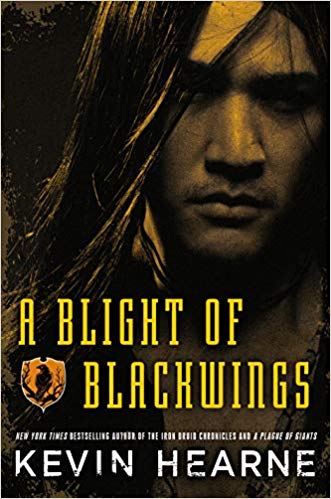 A Blight of Blackwings (Seven Kennings, #2) by Kevin Hearne
A Blight of Blackwings (Seven Kennings, #2) by Kevin Hearne Format: audiobook, eARC
Source: purchased from Audible, supplied by publisher via Edelweiss, supplied by publisher via NetGalley
Formats available: hardcover, paperback, ebook, audiobook
Genres: epic fantasy, fantasy
Series: Seven Kennings #2
Pages: 512
Published by Orbit on February 6, 2020
Purchasing Info: Author's Website, Publisher's Website, Amazon, Barnes & Noble, Kobo, Bookshop.org
Goodreads
From the New York Times bestselling creator of The Iron Druid Chronicles comes the highly anticipated sequel to A Plague of Giants: A world-breaking war--an invasion of giant warriors--that inspires a movement to fight back.
SOLDIER AND AVENGER Daryck is from a city that was devastated by the war with the Bone Giants, and now he and a band of warriors seek revenge against the giants for the loved ones they lost. But will vengeance be enough to salve their grief?
DREAMER AND LEADER Hanima is part of a new generation with extraordinary magical talents: She can speak to fantastical animals. But when this gift becomes a threat to the powers-that-be, Hanima becomes the leader of a movement to use this magic to bring power to the people.
SISTER AND SEEKER Koesha is the captain of an all-female crew on a perilous voyage to explore unknown waters. Though Koesha's crew is seeking a path around the globe, Koesha is also looking for her sister, lost at sea two years ago. But what lies beyond the edges of the map is far more dangerous than storms and sea monsters. . . .
In this sequel to A Plague of Giants, these characters and more will become the voices of a new generation bringing hope and revolution to a war-torn world.
My Review:
Like the character Dervan in this story, I became so caught up in the tale as it unfolded that I wanted spoilers! Or at least I wanted Fintan the Bard to get on with it a whole lot faster. Which meant that as much as I love the audio version of this story, I switched to the book at about the ⅓ point just so I could find out what happened next. And next after that. And after that. And so on right until barreling through to the end, even knowing that this story as a whole is not done yet.
Dammit.
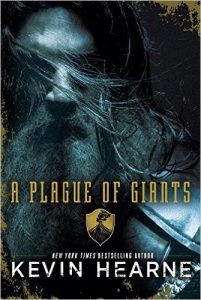 Just as in the first book in the series, the extremely awesome and utterly marvelous A Plague of Giants, the story that we are reading is mostly the story itself being told by Fintan the Bard to the crowd camped on Survivors’ Field in Pelemyn. The people who survived the events of the first part of the story and fetched up in Pelemyn as refugees from the multiple crises that have afflicted Teldwyn.
Just as in the first book in the series, the extremely awesome and utterly marvelous A Plague of Giants, the story that we are reading is mostly the story itself being told by Fintan the Bard to the crowd camped on Survivors’ Field in Pelemyn. The people who survived the events of the first part of the story and fetched up in Pelemyn as refugees from the multiple crises that have afflicted Teldwyn.
Not just one but two plagues of giants.
The title of this entry in the series is a tad more subtle. The book A Plague of Giants contained actual plagues of giants, after all. But the blight of blackwings referred to this time is not a literal plague of the same sort.
Instead, a blight of blackwings feels like it’s the equivalent of “a murder of crows,” or “an unkindness of ravens.” Or possibly both, as the blackwings of Teldwyn occupy the same niche as crows and ravens do. They are carrion birds. They eat the dead, and they feast after a battle.
They also hover over trouble in the hopes that said trouble will result in some dead for them to eat. Hopefully soon, from their perspective. Which means that if you are a human blessed by the sixth kenning, and your gift is communication with blackwings, you can spot trouble coming before your blackwings get a meal.
And that’s the story of A Blight of Blackwings, the spotting of trouble on the horizon. However, just like in A Plague of Giants, there are lots of blackwings hovering over trouble in lots of places. A concept which the UK cover for the book makes much more clear!
With even more on the horizon by the end of this portion of the Bard’s tale. And it’s awesome every step of the way. For multiple definitions of the word “awe”.
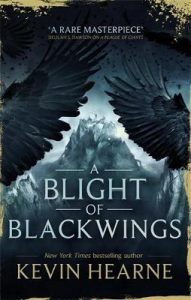
Escape Rating A++: To paraphrase Hanima the Hivemistress, this book is the BEST!
This is a huge story, covering an entire world. You do have to have read A Plague of Giants to get into A Blight of Blackwings. If you love epic fantasy you’ll be glad you did. This world-spanning story is a real treat.
That being said, it’s necessary to talk about what makes it such a treat.
A big part of that for me was that the author’s experiment in voice really worked. The author said that he was trying to recreate the feeling of the old bardic tales as Homer used to tell them. While we don’t know what that was really like, what he has created here turns out to be a fascinating way of telling a big story with a huge cast of characters while making sure all of those threads are easy to follow.
The framing story is that Fintan the Bard is telling the tales using the voices and faces of the people who experienced each part, strung together with a bit of what is going on in the city through the eyes of Dervan, the chronicler and confidant of the city’s ruler. So we see what has happened in the past through Fintan’s tale, and what is happening in the present through Dervan’s first-person asides.
I will also say here that the two voice actors do a terrific job of making all of the voices distinct. Even when I switched to reading the ebook I was still hearing their voices in my head and it definitely helped form my picture of who each of the different characters was.
The invention of the “kennings” the magic of this world, is a new take on the whole magic in fantasy idea, and the way that it works underpins the politics and people’s perspective on their world. On the one hand, there’s the sense that the kennings kind of function like the old saying about when the only tool you have is a hammer, every problem looks like a nail, just writ very, very large.
At the same time those kennings underpin both politics and religion, so the discovery of a sixth and possibly even a seventh upsets a whole fleet of apple carts.
One other thing that makes this magic system different is the price that is paid to wield it. One of the terrible things that frequently happens in other magic systems is that magic is either the ultimate power or so easy to use that everyone gets lazy. The cost of magic in this world is extremely dear, both to acquire it and to use it. Magic users always have to think about whether the ends they have to achieve justify the loss of years of their lives. Perhaps even all the years they have left.
This is also a story where the use of language can shock you with it’s terrible beauty. After discovering that his entire town has been slaughtered in his absence, the leader of a band of hunters reflects that, “Most of us were still in the shock stages of grief, the foyer to a mansion of pain in which I knew we’d dwell for many years. Just beyond, however, a red room beckoned, a spacious expanse for rage, and I had little doubt the entire band would step in there with me for an extended period.” I was struck by that phrase, and chilled by an intense feeling of recognition. It feels right and true and haunting in the vividness of the image. A haunting that returned every time that character refers back to it. Because he’s right, they are all heading for that red room of rage – and possibly taking the rest of the country with them.
We’ll find out in book 3 of the series, tentatively titled A Curse of Krakens. I want it so bad, and I want it now! But I expect I’ll have to wait a couple of years, based on the time between A Plague of Giants and A Blight of Blackwings. And it will be SO worth it!

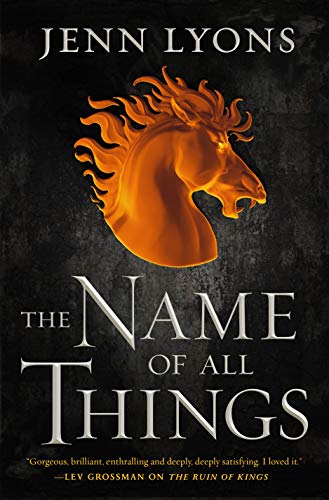 The Name of All Things (A Chorus of Dragons, #2) by
The Name of All Things (A Chorus of Dragons, #2) by 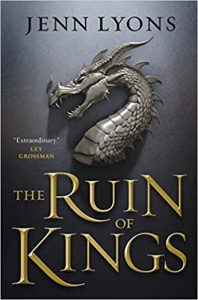 This series began early in 2019 with
This series began early in 2019 with 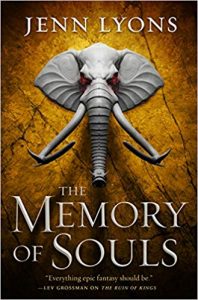 One of the other things that makes this series so mesmerizing is that it is never a simple contest of good vs. evil. Everything in this world is in shades of gray. The gods are not really gods. However, the demons, for the most part, at least so far, seem to really be demonic. But the characters who commit evil acts, like Relos Var and Senera, may have the best of motives. And may still be evil at the same time. Nothing is clear but everything is compelling.
One of the other things that makes this series so mesmerizing is that it is never a simple contest of good vs. evil. Everything in this world is in shades of gray. The gods are not really gods. However, the demons, for the most part, at least so far, seem to really be demonic. But the characters who commit evil acts, like Relos Var and Senera, may have the best of motives. And may still be evil at the same time. Nothing is clear but everything is compelling.